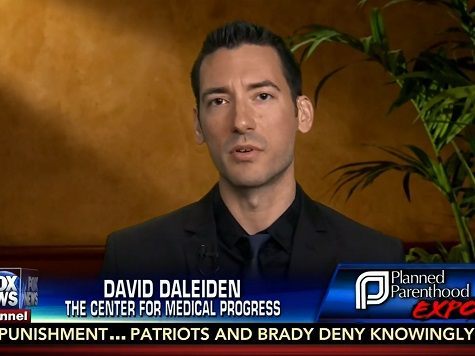Two pro-choice law professors call the prosecution of citizen journalists “a stunning act of legal jujitsu,” and say they are “deeply disturbed” over a Harris County, Texas grand jury’s decision to indict the makers of the videos who exposed Planned Parenthood’s apparent practice of selling the body parts of aborted babies.
Writing at CNN, Cornell University law professors Sherry Colb and Michael Dorf say the indictment of David Daleiden, director of Center for Medical Progress (CMP), and CMP employee Sandra Merritt could have a “chilling effect on undercover journalism” as well as raise “questions about laws targeting free speech.”
Though the exact nature of the evidence against Daleiden and Merritt has not been revealed, the law professors summarize, “[I]t appears the charges arise entirely out of their efforts to deceive Planned Parenthood officials in order to gain access.”
The citizen journalists received a felony charge related to tampering with government records and using false IDs, and a misdemeanor charge for attempting to purchase fetal body parts.
“[T]he misdemeanor charge of attempting to buy fetal remains seemingly overlooks the fact that Daleiden and Merritt were only posing as buyers to expose what they believed was illegal conduct by others,” observe Colb and Dorf, who then observe the much broader implications in the case against the journalists.
“Undercover exposés play a vital role in informing the American public of important facts that would otherwise remain hidden,” they write, pointing by way of example to the undercover work of Upton Sinclair in 1906 in The Jungle, which exposed the Chicago meatpacking industry.
“Animal rights activists who gain access to farms, slaughterhouses and laboratories by disguising their true intent may face criminal charges,” the law professors also suggest.
A very recent example is the story of “Anonymous, Inc.” which aired on CBS’ 60 Minutes last weekend. The script from the story reads:
Tonight, with the help of hidden camera footage, we’re going to show you how easy it seems to have become to conceal questionable funds from law enforcement and the public.
You need look no further for evidence than the changing skyline of New York City, where much of the priciest residential real estate is being snapped up not by individuals, but by anonymous shell companies with secret owners.
There’s nothing illegal about it as long as the money’s legitimate, but there’s no way to tell, if you don’t know who the real buyers are. It is one of the reasons Global Witness, a London-based nonprofit organization that exposes international corruption, came to New York City 19 months ago. It wanted to see how helpful U.S. lawyers would be in concealing questionable funds.
Other examples – as Independent Journal observes – include Horace Greeley’s New York Tribune-sponsored undercover reporter Mortimer Thomson, who posed as a slave-buyer to expose the evils of slavery; Elizabeth Jane Cochran who – using the pseudonym Nellie Bly – infiltrated Blackwell’s Island to expose conditions for the mentally ill; and Pulitzer Prize winner Pam Zekman, who set up the fallacious Mirage Tavern in Chicago in order to expose how medical staff at various facilities were “performing abortions” on women who were not pregnant.
Colb and Dorf explain that while the Supreme Court has affirmed the First Amendment right to unpopular speech – even if it is false – a federal appeals court has rejected “a general First Amendment right of journalists to use deception to gain access to private property.” In sum, while freedom of the press exists under the Constitution, journalists and investigators can still be “stifled.”
“The Planned Parenthood case reveals that activists — and journalists — might also have to go to prison for undercover reporting if they violate any laws to gain access to the targets of their investigation,” Colb and Dorf continue. “Consequently, the public fails to learn about some important matters.”
The authors make their case:
We need journalists and activists to investigate. With the Supreme Court seemingly unwilling to protect undercover investigators against general criminal laws, the job of protecting free speech would appear to fall to legislators and state court judges.
Colb and Dorf acknowledge the terrain in this area is tricky, particularly in the age of social media when “anyone with a mobile phone can plausibly claim to be a citizen journalist.” However, they maintain that “the criminal prosecution of Daleiden and Merritt, even if they did break the law, could chill undercover journalists and activists everywhere.”

COMMENTS
Please let us know if you're having issues with commenting.